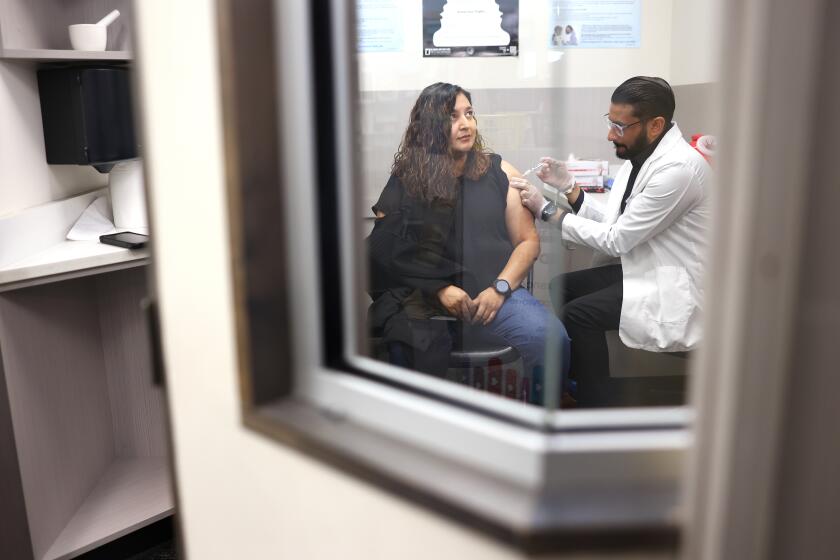Direct AIDS Dollars at Thailand
With all its strains and permutations, the AIDS virus remains a maddeningly complex and ruthlessly elusive protein parasite. Its biochemical architectures defy attempts to neutralize it. Consequently, medical experts are seriously divided over whether effective AIDS vaccines are even remotely possible.
No matter. Everyone--from the National Institutes of Health to established pharmaceutical houses to budding biotech entrepreneurs--is investing hundreds of millions of dollars in hot pursuit of the improbable. But if the United States is serious about spending billions developing an AIDS vaccine, the best and most cost-effective strategy may be to invest more research and development efforts in Thailand than in California and New York.
Just as the United States spends money to maintain special relationships with Great Britain and France for reasons of national defense, America should also spend money for just as serious an involvement with Thailand for reasons of public health security. An intimate medical research relationship with Thailand should be a centerpiece of any U.S. AIDS policy.
To be sure, America’s medical research establishment should also have close relationships with India and key African countries. But for a variety of reasons--medical, demographic, legal, ethical and economic--a full-scale partnership with a nation such as Thailand offers the best potential return on the American HIV vaccine research dollar.
Why? Thailand has the medical infrastructure, the HIV population profile--an estimated 2% of sexually active adults are infected, or up to 600,000 people--and the prevention-oriented public health policies that make it a superb candidate for such an initiative. The country’s rigorous HIV tracking and notification and its monitoring of commercial sex practices makes it a more rigorous test site than even the United States. Thailand also has fewer lawyers.
“One of the key reasons for such interest is that Thailand has been shown to have at least two different types of strains of HIV: an African strain and a U.S.-European strain,” says Dr. Richard Marlink, executive director of the Harvard AIDS Institute. “This being a worldwide epidemic--but with apparently different strains--we can’t afford to take an isolationist view. We’re going to have to have vaccines to protect our population worldwide.”
Indeed, Marlink and other AIDS experts argue that instead of the current 4-1 domestic/international spending ratio for AIDS vaccine research, the NIH would be smarter to split its AIDS vaccine research investments closer to fifty-fifty.
“The focus needs to shift to international,” Marlink says. While he prefers to see a more diversified international portfolio of AIDS vaccine research, he acknowledges that budget constraints may require more focused partnerships.
“Thailand is in fact the model for appropriate government-led response to the AIDS epidemic,” says Dr. Penny Hitchcock, chief of the NIH’s Sexually Transmitted Diseases branch. “To the politicians who are deciding how and where to make the AIDS investments, why not consider Thailand more seriously? Where else can we effectively test and monitor the efficacy of a new vaccine? How else can we see how to integrate a new vaccine in the context of an overall public health policy of AIDS prevention?
“Our at-risk populations may present more complications for vaccine tests now,” she says.
That’s not to minimize the plight of America’s high-risk HIV populations. But it may well be that their best hopes will come from domestic initiatives coordinated with overseas trials should a vaccine ever be discovered.
“If we can make a vaccine against a Thai strain, we should in principle be able to make a vaccine against any other strain,” says Maurice Hilleman, director of the Merck Institute for Therapeutic Research.
Moreover, it’s simply poor public health policy to separate the search for an effective AIDS vaccine from such overarching public health issues as education, prevention and treatment. Even if an effective AIDS vaccine is introduced within the next decade--and that’s not likely--the fundamental public health challenges of prevention still remain.
“For us to think that everybody is going to just roll up their sleeves, get their shot and then eat, drink and be merry is crazy,” NIH’s Hitchcock says. “We really are dreaming if we think there will be a magic bullet that will protect us from HIV throughout our lives.”
In fact, as Anthony Fauci, lead AIDS researcher at NIH, points out, his agency’s quest for the AIDS vaccine is already international.
“I think this is already being considered,” he says. “I don’t think this is incompatible with what is already being discussed. . . . Thailand is of particular interest because of its health care system, its relationship with U.S. armed forces and being very friendly to doing clinical trials.”
The emerging problem, Fauci says, is that some Thai factions have expressed reluctance about becoming medical guinea pigs for the West.
This is precisely the reason why the United States should make every effort to treat Thailand as a partner, not just a research outpost, and shift much of the Thai medical liaison from the U.S. Defense Department to the NIH. What’s more, the United States should guarantee a low-cost supply of any AIDS vaccine should one be created. The research focus on Thai strains of HIV should make it clear that this is good for Thailand.
“Vaccine trials in developing countries will have a major role over the next few years,” Fauci predicts. “They will be important.”
If an AIDS vaccine is ever to be discovered, overseas trials will indeed be important, and U.S. AIDS policy, along with the fortune it commands, must be invested accordingly.



